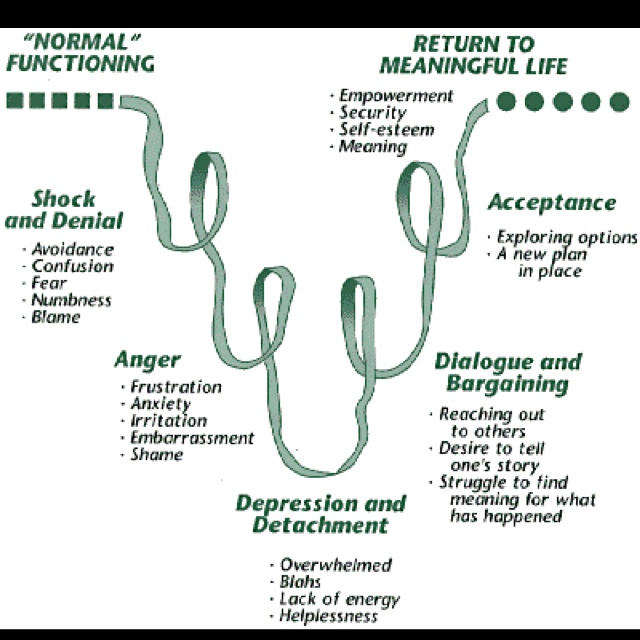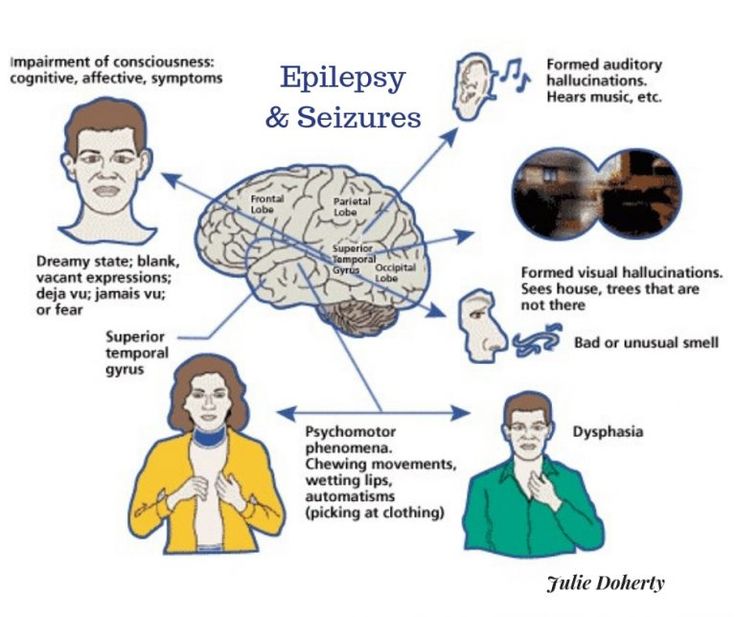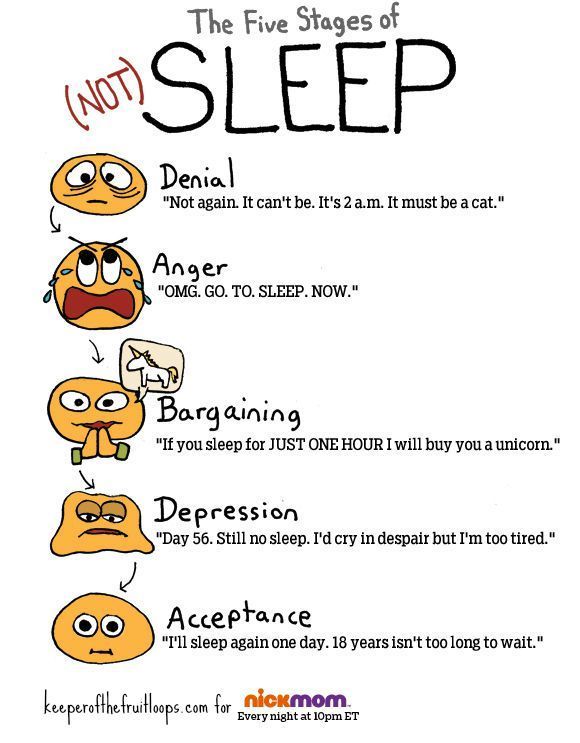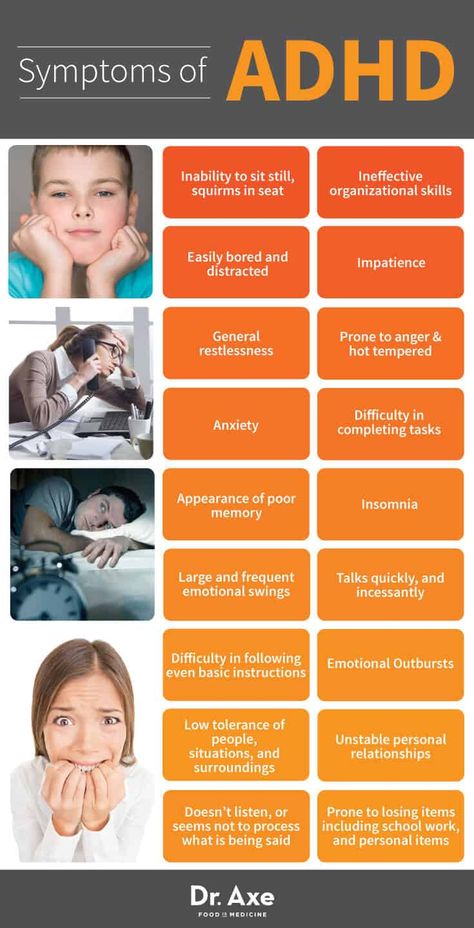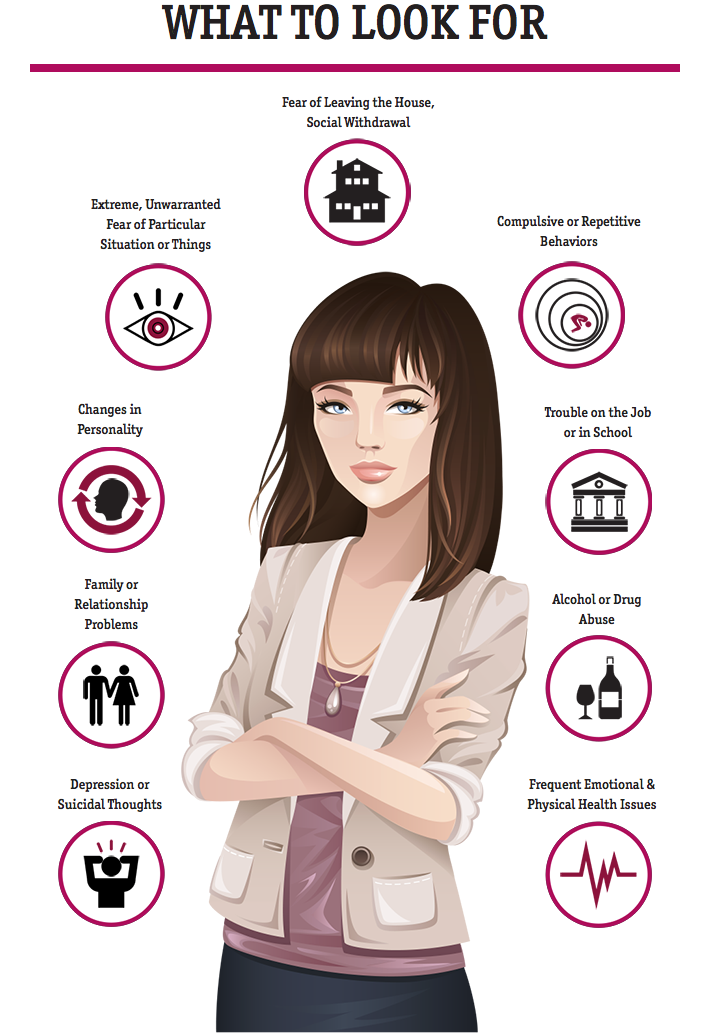Emotional cheating recovery
15 Tips For Emotional Affair Recovery
What is an emotional affair?
Emotional infidelity, or an affair of the heart, usually starts out innocently enough. It feels like a good friendship. You just click. They get you. You enjoy your time together – that’s not cheating, right?
But it soon becomes obvious that there’s something more going on. Maybe you find yourself sending late-night texts. Perhaps you dress up a little when you know you’re going to see them.
You start confiding deep, intimate thoughts to each other. There’s a spark, and you know this is more than friendship – even if you don’t want to admit it yet.
It’s easy to convince yourself that because there’s no sex involved, it’s not cheating. But an affair of the heart is still infidelity, and the secrets and lies still have the power to break your current relationship.
Also watch:
If you are still unsure if your friendship has turned into something more, here are some emotional affair signs:
- You can not stop thinking about them.
- You draw comparisons between this person and your partner.
- You are sharing intimate details.
- You are spending more and more time together.
- You hide the relationship from your partner.
- You get butterflies when you meet them.
- You dress to impress.
- You have started having dreams about them.
- Intimacy with your partner is decreasing.
So, how to deal with infidelity, and how to get over an emotional affair?
An emotional affair or emotional cheating feels thrilling, intoxicating, and addictive. It’s hard to let go of.
If you’ve been emotionally cheating in marriage, the first towards emotional infidelity recovery is to stop guilt-tripping yourself.
You can’t go back and undo it. When dealing with betrayal, what you can do is work on recovering from an emotional affair so you can rebuild your present relationship.
Falling in love is not just emotion but a lot of science and can be linked to hormonal changes.
According to the research, the love stage of the relationship lasts between six months to 18 months. This does not mean the love fades over time. It simply means that people get used to love each other over a course of time.
15 tips for emotional affair recoveryAn emotional affair can cause an upheaval. Wondering how to recover from emotional cheating? Try our 10 tips for getting over emotional infidelity or emotional infidelity recovery.
1. Be honest with your partnerThe thing about extramarital affairs is that it’s tempting to sweep it under the carpet rather than hurt your partner, but don’t.
A survey conducted to explore how honest people are about their infidelity uncovered that no matter how honest a person might be about their infidelity to their partner, they always leave out certain key details.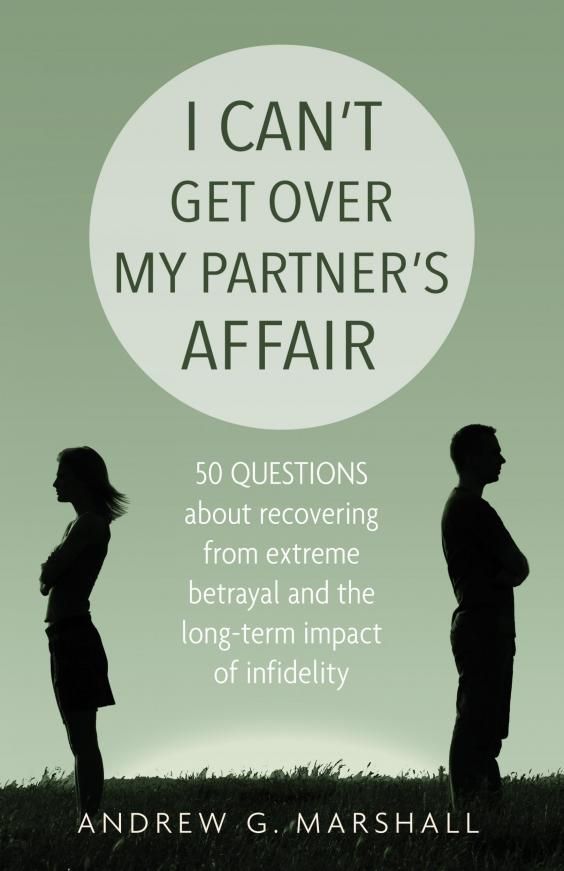
Honesty is vital in a relationship, especially for an emotional affair recovery, and even though the truth will hurt, it’s better to build the rest of your relationship on the truth, not a lie.
So, the first emotional affair recovery step is to take responsibility for your actions, and don’t blame your partner. Just tell them as honestly and gently as you can.
2. Be sure you’re committed to your relationshipBe honest with yourself about the future of your relationship. You and your partner can achieve emotional infidelity recovery, but it takes 100% commitment.
Make sure you’re willing to put your heart into rebuilding your relationship and finding a way for healing from infidelity together.
3. Let yourself grieveTo a certain extent, we can all understand the disappointment and sadness a person might feel if they have been cheated on.
Moreover, a study was conducted to provide a broad look at the losses and grief felt by the betrayed partner. But what about the person who was cheating? What about their loss and grief.
But what about the person who was cheating? What about their loss and grief.
An emotional affair feels intoxicating and addictive and takes up a lot of your thoughts.
If you’re feeling guilty, you’ll resist letting yourself grieve, because you think you don’t deserve to. But the fact is, the other person was a big part of your life, and it’s ok to let yourself be sad about the loss of that connection.
Grieving also helps you understand why you were unfaithful and what is it that you expect from your relationship.
4. See the difference between infatuation and loveEmotional infidelity might feel like love, but in most cases, it’s really just infatuation.
That rush of endorphins, the excitement of hurried late-night texts, or deep heart-to-heart conversations … it feels a lot like love.
Take a step back and realize that real love is built on long-term commitment and shared life, not a short but heady connection.
5. Work on rebuilding trustAs a solution for how to repair a marriage after an emotional affair, your partner will need time to learn how to trust you again, and that’s perfectly natural.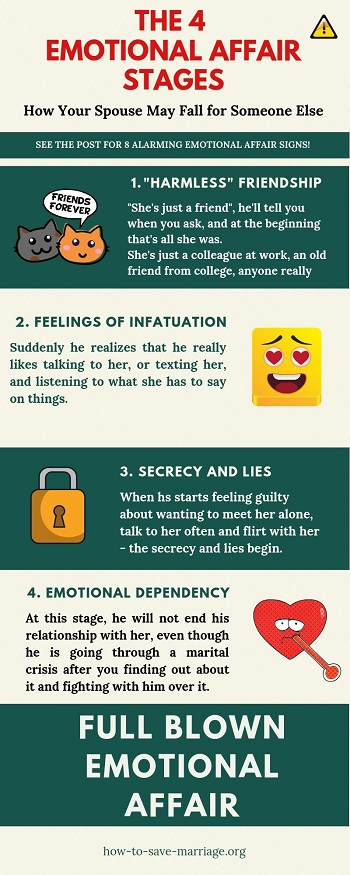
Show your commitment to mending your relationship by working on rebuilding trust with them. Ask what they need and how you can show them you can be trusted, and then give them as much time as they need to trust you again.
6. Analyze the reasonsFor overcoming infidelity and preventing another incident, you’ll need to analyze why you were emotionally unfaithful.
What was it about them that attracted you? What did you feel was missing in your life or your relationship that made it easy to fall into an emotional affair?
Learn to recognize and take care of your emotional needs, so you don’t look towards someone else to do it.
7. Give each other spaceUndoubtedly, your emotions and that of your partner are heightened at this stage. You could be feeling anger, hurt, insecurity and so much more. Not just this, the pain could also manifest physically by way of symptoms like lack of sleep.
The video below discusses reassuring your anxious partner that you two are okay, that you love them, and that your need for space is only your unique way of recharging your batteries. Set a deadline for your alone time, otherwise, they will think you’re ending things:
Set a deadline for your alone time, otherwise, they will think you’re ending things:
Reconnect with your partner so you can remember what you love about them and why your relationship is worth saving.
Talk to them about ways to reconnect and let them set the pace. A romantic night out or in, a short vacation, or even a simple coffee date or home-cooked meal will help you feel closer again.
9. Ask questionsFor an effective, emotional affair recovery, ask questions from your partner that could calm your heart. Let them know that certain things are bothering you and you want the bond to strengthen with time. Proceed with asking questions but know that certain details might hurt you further.
So, tread the path carefully.
10. Get your feelings outIt’s normal to feel a range of emotions from guilt to grief to anger when you’re dealing with the fallout of an emotional affair.
For emotional infidelity recovery, work your feelings out physically with dance or exercise, write them out in a journal, or consider seeing a therapist help you sort through them.
11. Find a healthier focusEmotional infidelity gives you a focus, albeit an unhealthy one.
Try to find a healthier focus for your emotions and energy, such as volunteering with a community organization, learning a new hobby, or advancing your career.
The end of an emotional affair leaves a gap in your life – take the chance to fill it with something nurturing.
12. Practice self-careAdmitting to and ending emotional infidelity takes a lot of mental and emotional energy. You’ll feel like you’re on a rollercoaster of emotions at times and might notice effects on your stress levels, sleep patterns, and appetite.
Take good care of yourself with healthy food, fresh air, exercise, good sleep, and spend time looking after yourself.
Related Reading: Healing Your Relationship with Food, Body, and Self: Sustaining Self-Care Practices13.
 Get help
Get helpPursue marriage counseling from a certified therapist to communicate your overwhelming emotions. Intensive sessions are necessary for the emotional affair recovery process.
You can also seek support from your friends and family who understand what you are going through.
14. Seek to forgive themForgiveness will not be a one-time act. It is a process, a journey for your emotional affair recovery.
Forgiving emotional affair is not easy. When you forgive your spouse, it doesn’t mean the hurt will go and things will switch back to normal. You forgiving your spouse will just be a step toward accepting your relationship will be okay with time.
Related Reading: Learning To Forgive: 6 Steps to Forgiveness In Relationships15. Listen to them
Coping with an emotional affair can be difficult for both partners. Try to show compassion to your spouse rather than returning the bad deed with another bad deed for the emotional cheating recovery for both of you.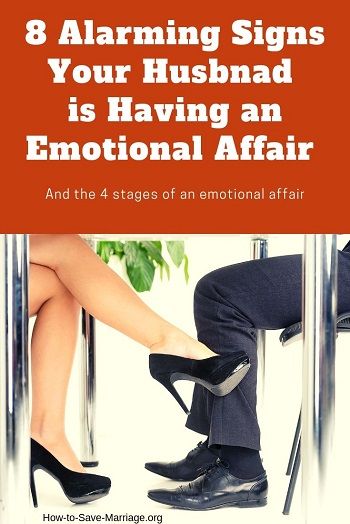
By listening to your partner, you are letting them calm the chaos in their head. In any case, this does not mean you own their emotions. Just convey your forgiveness for the long process of restoring your relationship.
Related Reading: The Importance of Art of Listening in a RelationshipWrapping up
The end of an emotional affair usually comes with a heavy dose of guilt and regret. That doesn’t mean you should punish yourself – be gentle with yourself and recognize that you need healing too.
Only then can you move towards emotional affair recovery and put the affair behind you.
How to Build Back Your Marriage
Becoming emotionally intimate with someone other than your partner can be just as hurtful for your partner as a physical affair — but emotional affair recovery is possible.
Infidelity can be a relationship ender. It’s an experience where you choose someone other than your partner to become intimate with physically, emotionally, or both.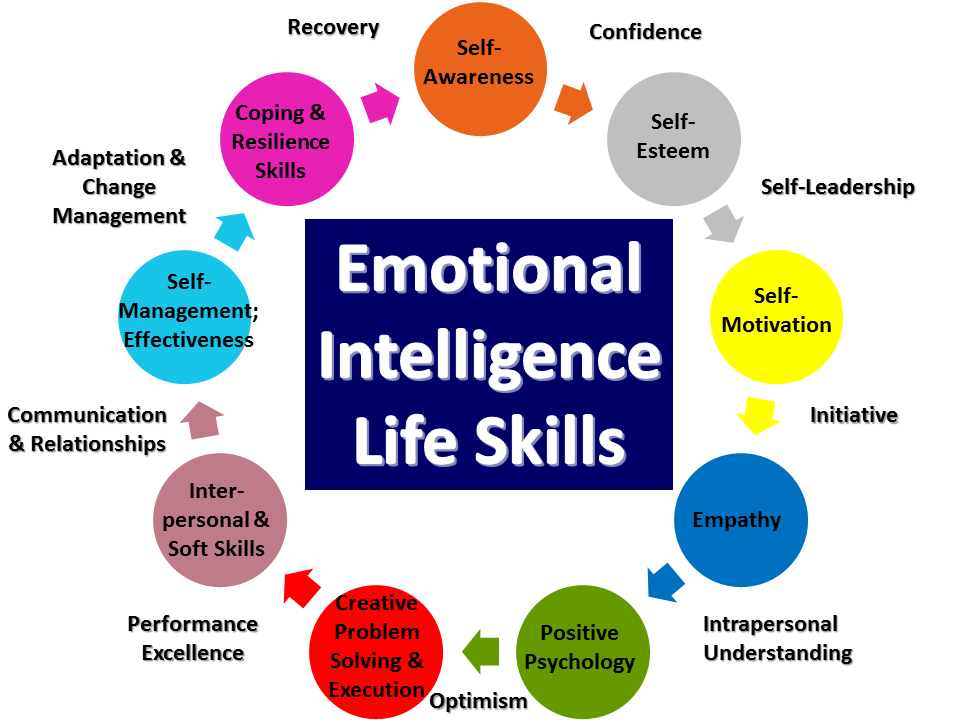
Emotional affairs may never progress to the physical level, but they still involve a closeness that can pull you away from your current partner.
You may start to feel more aligned with the person you’re now sharing thoughts, feelings, dreams, and vulnerabilities with.
Emotional infidelity can be painful for both parties— a longing for connection, validation, and a breakdown of trust can prove challenging to overcome. Ultimately, both partners need to be willing to work toward emotional affair recovery to continue the relationship.
Yes. Your marriage can come back from emotional infidelity.
“Marriages can not only survive emotional affairs, they can become stronger than they were prior to the affair,” says Dr. Dena DiNardo, a clinical psychologist and licensed marriage and family therapist from Philadelphia.
“It depends on what each partner wants. If they both want to be together and improve their relationship, with a lot of honest reflection and effort, things can significantly improve. ”
”
DiNardo explains emotional affairs happen for many reasons, but primarily because one partner isn’t feeling connected with the other partner and emotional needs aren’t being met.
While this doesn’t justify emotional affairs, it may be part of the reason why post-infidelity your relationship can become stronger as needs are communicated and you gain a deeper understanding of one another.
At first, it may feel as though emotional affair recovery isn’t possible. The initial feelings of hurt and shock can be overwhelming.
It’s okay to take time to allow yourself to grieve for your relationship as you knew it. When you’re ready and if you’re willing, you can start the process of emotional affair recovery.
Accepting responsibility
It can be challenging to acknowledge your part in emotional infidelity if you weren’t the party participating in the affair.
However, according to Dr. David Helfand, a licensed psychologist specializing in couples therapy from Saint Johnsbury, Vermont, the responsibility often falls on the shoulders of both parties.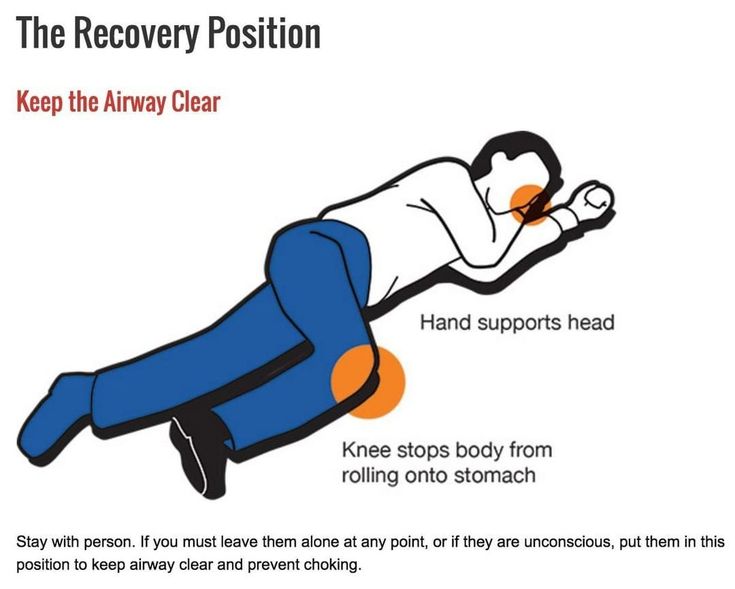
“You have to explore each person’s contribution to the affair. We have a tendency in our society to think affairs happen because one person is a jerk and goes outside the marriage. That is actually not the norm.,” he says.
Helfand indicates it’s the dynamic between partners that tends to lead to emotional affairs, and both parties need to understand what it is they have to improve on.
If you’re not ready to enter into this process with another person, journaling may provide a way to discover your needs without fear of judgment.
Communicating
DiNardo states that once you and your partner have completed a humble and honest process of introspection, the next step is communicating your wants, needs, and personal patterns to each other.
Because infidelity can create strain that may diminish communication, third-party mediation in couples therapy can be crucial to this part of the process.
“Couples therapy is an important and crucial element to overcoming an emotional affair,” she says, noting it can help you reassess expectations of the relationship and understand the boundaries or lack thereof.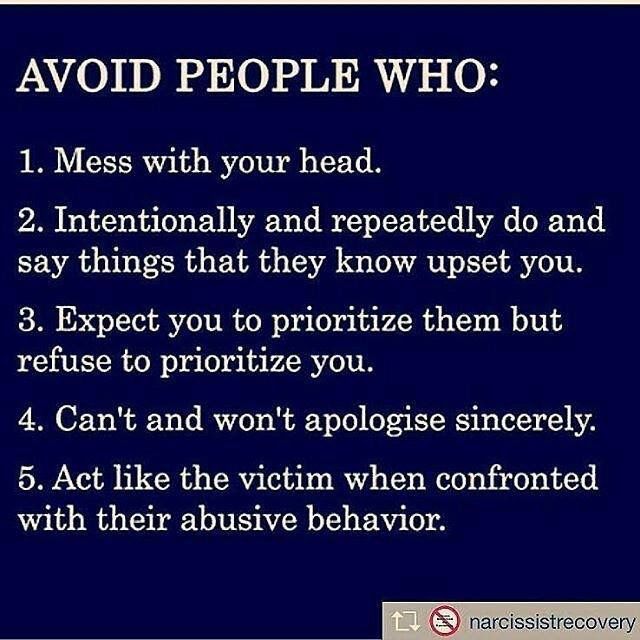
What to do if you had an emotional affair
If you’ve been having an emotional affair, understanding why can be important. After introspection, you may realize you don’t want to — or shouldn’t — continue your current relationship.
Entering the process of emotional affair recovery implies you want your current relationship to work and improve, and that you see the potential for a happier outcome.
Cutting ties with the third party
“The very first step in affair recovery is to conclude the outside relationship with the affair partner,” says Terri DiMatteo, a licensed professional counselor from Princeton, New Jersey.
“Since it is an emotional affair, this needs to be done with great care to assure that the outside relationship concludes firmly.”
Being completely open
When your emotional affair comes to light, being completely honest and transparent about it can be important to healing your current relationship.
“Many people give a brief description of what happened in the beginning and this can create more harm and more distrust when more details come out later on,” says Rachel Elder, a license mental health counselor and relationship coach from Seattle, Washington.
Expressing your remorse
DiMatteo indicates that apologizing for your emotional affair is often not enough — you may need to genuinely express your remorse for causing your partner pain.
She explains, “When the party that did not engage in the affair expresses their deep pain and hurt, the party who engaged in the affair needs to convey their own emotional pain at seeing and feeling how much pain their spouse or partner is in.”
This specific type of empathetic apology can help your partner feel less alone in their distress.
“It helps the betrayed partner know that their feelings not only matter but have a direct impact on their spouse or partner. Research tells us that this approach is beneficial in moving a couple forward,” says DiMatteo.
Couples therapy can be an invaluable asset when seeking emotional affair recovery.
Not only can a professional help you and your partner explore your feelings and relationship dynamics, but they can also address any underlying conditions that may complicate emotional affair recovery.
While anyone can experience emotional infidelity in a relationship, certain mental health conditions and attachment styles may contribute to feelings of emotional disconnection.
“I would say emotional affairs could be common amongst most diagnoses related to anxiety and depression,” says DiNardo. “Those who are anxious and have difficulty regulating their affect may find comfort and/or temporary short term relief in their emotional affair partner, even though that can actually cause more anxiety.”
She adds that emotional affairs may feel like the perfect antidote for someone living with depression, which can be characterized by feelings of disconnect, isolation, and loneliness.
“Emotional affairs can also be common amongst those who have a more avoidant personality style or defense mechanism default,” says DiNardo. “Genuine intimacy with one’s primary partner can be incredibly overwhelming and threatening.”
Getting support
If you’ve experience an emotional affair in your relationship, you can speak to a qualified mental health representative anytime by calling the SAMHSA National Helpline at 1-800-662-4357.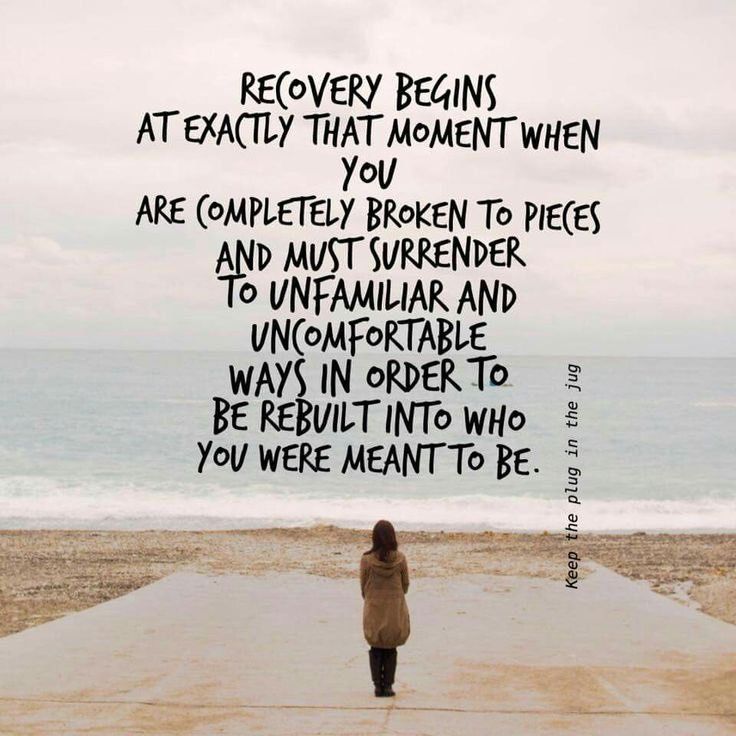
You can also join a free infidelity support network by visiting infidelitysupportgroup.com where you have access to additional resources, professional input, and insight from other couples who are working through similar experiences.
Emotional affair recovery is possible. It frequently involves honesty, introspection, genuine remorse, and a commitment to communicate emotional needs with your partner.
While there are steps you can take to heal after emotional infidelity, professional guidance can support both partners and provide a safe place for mediation.
Treason: a look from two sides. If you have been cheated on
Many people get into an emotional whirlpool after they find out about their partner's cheating. The person who has been cheated is overcome by an all-consuming sense of loss, and the person who has changed is overcome by conflicting emotions and decisions. You can’t prepare for this in advance, but through naming and accepting your feelings, you can come to the understanding that everything is fixable.
Clinical psychologist with 43 years of experience and a recognized expert on trust, intimacy and forgiveness, Janice Spring is sure that it is possible to survive infidelity and find the strength in yourself to restore relationships. The first natural reaction is shock. But once you can figure out what to do about it, chances are you won't feel empty anymore. nine0003
Affected partner's reaction
Cheating destroys our fundamental sense of order and justice in this world. Along with this, the feeling of control, self-respect and understanding of who you are disappear. But your feelings are a natural reaction to an extremely traumatic situation that has destroyed the integrity of the relationship and your belief that your connection with your partner is forever. And it would be strange not to feel lost after receiving such news.
To make it easier for you to cope with your feelings, you need to learn to understand them and anticipate your reactions. The healing process begins when you can look at emotions from the outside and understand what exactly is hurting you. The main thing in all this is not to lose hope and not to think that everything is lost forever. nine0003
The main thing in all this is not to lose hope and not to think that everything is lost forever. nine0003
Physiological consequences of infidelity
Cheating partner, which you learned about, causes changes at the physiological level. First of all, your nervous system and cognitive perception suffer. Adrenaline and other stress hormones act on the sympathetic nervous system and lead to increased arousal and anxiety. Signs of betrayal appear even where there are none. You lose sleep and feel tired from the endless stream of obsessive thoughts and constantly popping up memories and images. nine0003
But there may be a backlash. To protect you from pain and emotional overload, the body secretes endogenous opioid peptides that act on us like morphine. We seem to fall into hibernation, withdraw into ourselves and lose interest in relationships and activities that used to give pleasure and energize.
It is impossible to gather strength, because you have practically none. Thoughts are scattered. In this state, you cannot concentrate, perform useless actions or sit, staring at one point. nine0003
Thoughts are scattered. In this state, you cannot concentrate, perform useless actions or sit, staring at one point. nine0003
Psychological consequences of betrayal
There are several types of losses that a partner goes through when faced with betrayal. But all of them are somehow connected with the loss of oneself. Let's take a look at these types in more detail.
- Loss of identity. Change makes you look at yourself differently. The familiar outlines of your own "I" are blurred, and you feel that something inside has broken.
- Loss of a sense of exclusivity. You lose confidence in your own worth and face a reality in which your union is not so strong, and someone else can make your partner happy. nine0026
- Loss of self-respect. If you guessed about the betrayal, but dismissed suspicions, with the idea that something like this could not happen to you, or went through humiliation and abandoned your basic values in an attempt to win back your partner, your self-esteem can crack.

- Loss of control over thoughts and actions. With a high degree of probability, obsessive thoughts will overcome you: you can endlessly scroll through your partner’s lies in your head, imagine betrayal in all its details and try to analyze the events that led to it. Any attempts to distract and calm disturbing thoughts will not bring the desired relief. This condition can lead to compulsive conduct disorder. You may start to spy on your partner, deliberately harm yourself (eating unhealthy food and alcohol, smoking, etc.), trying to shift the focus to repairs, fitness or shopping. But all these are only temporary measures that will not fill the void inside, but only slightly alleviate the condition. nine0026
- Loss of a fundamental sense of order and justice in the world. It seemed to you that you know how this world works, and you can control your life. But after you find out about the betrayal, the world ceases to be safe and orderly. We have to reconsider the basic concepts of honor and justice in all spheres of life, including love and marriage.
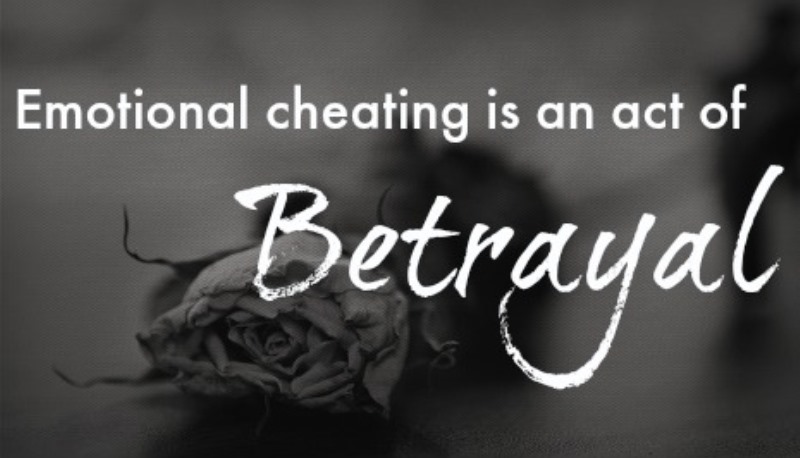
- Loss of communication with others. On the one hand, you may want to tell the whole world about your experiences, and on the other, you want to keep your shameful story a secret. nine0026
- Loss of goals and desire to live. When you no longer have faith in love and your worth, and it seems that existence brings more pain than non-existence, suicidal thoughts may arise.
- The loss of the desire to live after a betrayal of a partner is the saddest consequence. The paramount task of a person who has been cheated on is to do the almost impossible and come to terms with despair, even if you don’t see a way out of the situation yet.
Gender differences and reactions to infidelity
Men and women react differently to their partner's infidelity. The differences, which we will analyze further, describe the typical reactions that are characteristic of the majority. But that doesn't mean these patterns apply to you. Sometimes it's the other way around. Understanding these biological and cultural programs will explain your reaction to infidelity and allow you not to feel alone, and your partner will better understand your feelings.
Understanding these biological and cultural programs will explain your reaction to infidelity and allow you not to feel alone, and your partner will better understand your feelings.
Difference #1: women try to keep relationships; men turn around and leave
If a woman has been hurt by infidelity, she is likely to try to save the relationship, partly because her culture has taught her to please others and ignore her own needs. Men do not relate to the loss and try to find a good replacement who will definitely love and give due attention.
Difference #2: Women get depressed, men get angry
A common female reaction to infidelity is self-abasement. When a relationship cracks or falls apart, a woman is more likely to experience low self-esteem and depression because she not only loses her partner, she loses herself. Men, on the other hand, are more likely to direct their rage at their wife or her lover than at themselves. Because they are more likely to show anger and attack those who hurt them, at least in fantasy. nine0003
Because they are more likely to show anger and attack those who hurt them, at least in fantasy. nine0003
Difference No. 3: women feel their failure as partners in life, men feel their failure as a lover
A woman is likely to explain her husband's betrayal by her shortcomings as a person, and not by her behavior in bed. You will probably decide that the partner cheated because he was looking for love, and not just sex, and that it was not only his appearance that attracted him. As a result, you may take your partner's betrayal more seriously than he does.
A man is more likely to think that his wife cheated in search of better sex - a belief that will make him feel sexually inadequate and lead to envy and, as a result, violence against his wife or her lover. Men tend to overlook or downplay other non-sexual relationship issues, such as communication and intimacy, that mean more to their wives. nine0003
Difference #4: women become obsessed; men are distracted
Since women's self-esteem is closely related to success in their closest relationships, a woman is more likely to dwell on infidelity than a man and delve into lies, to the point of denying everything else. In the process, she becomes even more hardened by her partner's deceit and refuses to trust anyone for a long time. Constantly replaying the details of infidelity in her head, she feeds her pain and self-doubt. nine0003
In the process, she becomes even more hardened by her partner's deceit and refuses to trust anyone for a long time. Constantly replaying the details of infidelity in her head, she feeds her pain and self-doubt. nine0003
Men, on the other hand, are less absorbed in thinking about betrayal and spend more time on physical activities that give them a feeling of strength and confidence. They seem to be better able to cope with their pain and move on - often to a different partner.
How to help yourself?
If you are an injured partner, the first thing you need to do is to accept that your first emotional reaction (even if it was excessive, self-deprecating and frenetic) was completely normal and understandable, or at least the best of all that you were at that moment capable, given your condition and the severity of what happened. nine0003
You need to forgive yourself for losing yourself and begin to rebuild from within. To rebuild a relationship, you also need to understand your partner's reaction to cheating, no matter how radically different from yours. In this article, the partner was supposed to look at the betrayal through your eyes.
In this article, the partner was supposed to look at the betrayal through your eyes.
In the second part, we will show the situation from his perspective. Believe it or not, the person who betrayed you might just as well be struggling to figure out what happened.
psychologist's advice • Interview on the website of the publishing house BOMBORA
- Interview
- February 1, 2021
We find out why people cheat, how to survive infidelity and whether it can be avoided.
More interesting things below
This is done on the sly. It hurts. This is condemned. And yet betrayal continues to exist. Psychologist, sex therapist and author of the book "Infidelity" Marina Travkova has long been exploring the phenomenon of infidelity. They asked her about how to survive the first minute after the bad news, whether it is possible to prevent betrayal and whether it is worth giving a second chance. nine0003
— It is believed that men cheat more than women.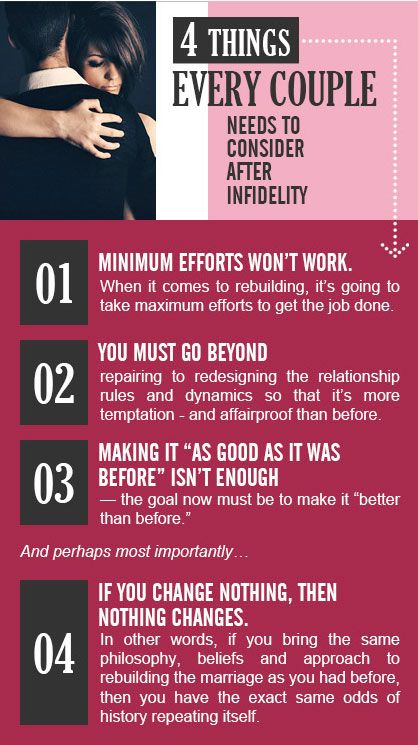 It's true? And why does society have such a different attitude towards male and female infidelity?
It's true? And why does society have such a different attitude towards male and female infidelity?
Yes and no. Women choose a partner for infidelity more carefully and hide it more carefully, because there are risks for them: pregnancy, violence and publicity. In societies where these risks disappear, women compare the score with men. In addition, women are more prone to emotional betrayal, love, which do not always turn into action, and men - just in time for action. Therefore, male infidelity seems to be more common. And the female, due to the fact that a woman often makes her visible only when everything is serious for her, is more destructive. nine0003
And there is still a double standard in relation to adultery in society: a man who walks around will be considered a fine fellow, and a woman - a frivolous person, to put it mildly. Why? Short answer: patriarchy.
— Infidelity is always painful and unexpected for a person who has been cheated on.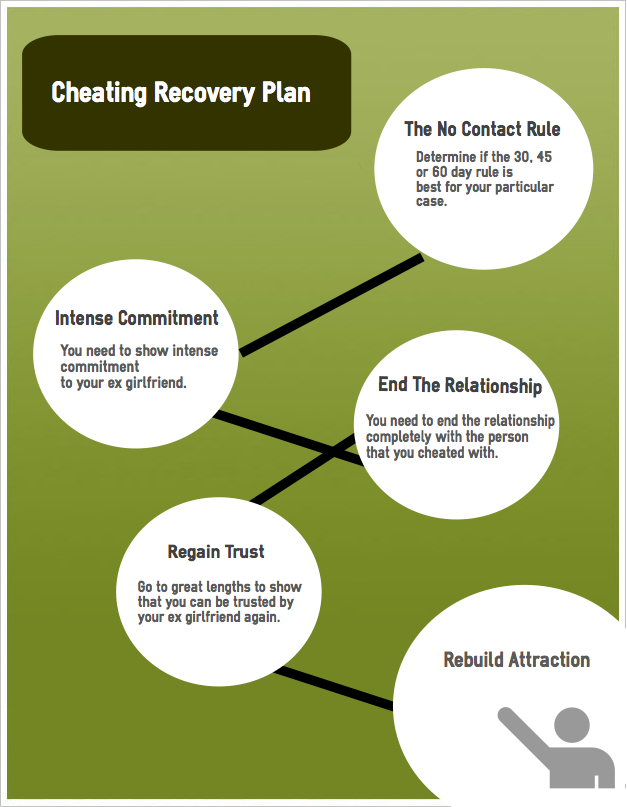 Is there some kind of checklist that will help you get together and not do stupid things in the first minutes after you hear this news?
Is there some kind of checklist that will help you get together and not do stupid things in the first minutes after you hear this news?
- Yes, and it's listed in the book. The chapter is called "In an acute situation" nine0003
First of all, take good care of yourself. Don't rush, don't rush at all, calm down first. Do not consult with the whole world, especially with forums or groups on the net, because everyone has their own situation. Do not blame yourself and do not tell everyone about what happened. Don't involve children.
- Often those who find themselves in a similar situation are torn apart by doubts: this is really a betrayal that should not be forgiven, or you can still give your partner a second chance. How to resolve these contradictions? Can trust be restored after infidelity? nine0048
Each betrayal has its own characteristics. Change is different. A short holiday romance will cause less pain than a long-term romantic relationship.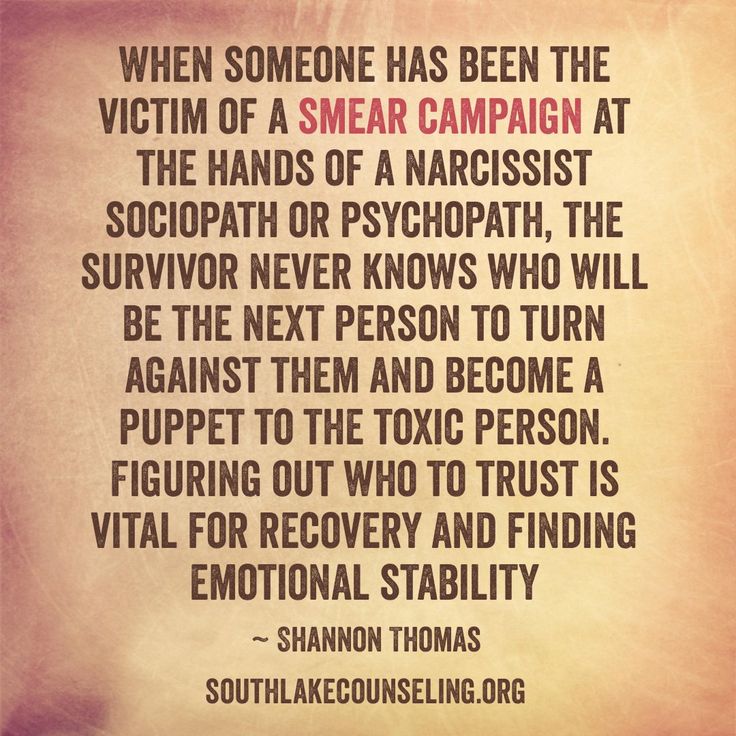 So, first you need to understand how serious everything is, how long everything has been going on, and most importantly, what the initiator of the betrayal himself says and thinks about it, is it “what’s wrong” for him or does he want to maintain a relationship and is ready to try for this?
So, first you need to understand how serious everything is, how long everything has been going on, and most importantly, what the initiator of the betrayal himself says and thinks about it, is it “what’s wrong” for him or does he want to maintain a relationship and is ready to try for this?
Whether it is possible and necessary to restore relations depends on this. There is a chapter in the book about what kind of betrayal you got. It has a table that will help you determine the extent of damage. nine0003
Restore in the previous form - no, you can not. But relationships can be saved and become better after betrayal, if both in a couple want it and are ready to do something for it.
Marina Travkova
— Often, infidelity is hard experienced not only by those who are being cheated on, but also by the initiators of the betrayal themselves. What pushes people to start new relationships on the side?
— Yes, it is not easy for those who cheat.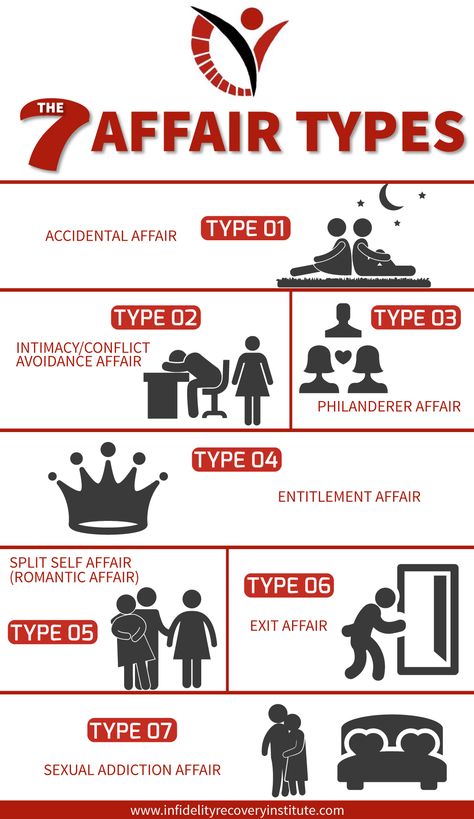 Now the stress that they experience has also begun to be investigated. The position of the initiator of treason is often advantageous only from the outside. There is also a lot of pain, fears and doubts inside. nine0003
Now the stress that they experience has also begun to be investigated. The position of the initiator of treason is often advantageous only from the outside. There is also a lot of pain, fears and doubts inside. nine0003
People are pushed into new relationships for very different reasons: from boredom and the search for novelty, to deep love for another person.
Marina Travkova
And, you see, betrayal is dramatic, painful, whatever, but it is not banal, not boring, and sometimes something finally happens in your life, you feel alive and real.
— Before the interview with you, our readers were invited to ask questions that concern them. A subscriber of our Instagram account asks what to do if the fear of betrayal haunts in all respects? nine0048
I advise you to convey this fear to a psychologist. Fear is not an enemy, but our friend. This is a danger signal, but it can be excessive or false, because you probably already have a negative experience in your life from somewhere related to infidelity. And your fear reacts to history from the past, preventing you from seeing the present.
And your fear reacts to history from the past, preventing you from seeing the present.
- And one more question from a reader. If in every relationship I encounter a betrayal of a partner, is the problem in me?
Responsibility for adultery lies with the one who cheats. At the same time, if there is a pattern in your relationship, then you need to deal with it. Perhaps you are attracted to a certain type, incapable of fidelity. Or you are missing some warning signals. With this, it is better to consult a psychologist individually. nine0003
- And I would like to end on an optimistic note. Is it possible to prevent infidelity? Is there any universal advice for those who are afraid of being in a love triangle?
Not universal. If we are in a relationship, we are taking a risk. But that's what makes them both valuable and beautiful. Therefore, perhaps the prevention of betrayal is to strengthen intimacy and intimacy. It is about not losing your curiosity to get to know the person next to you day after day.
